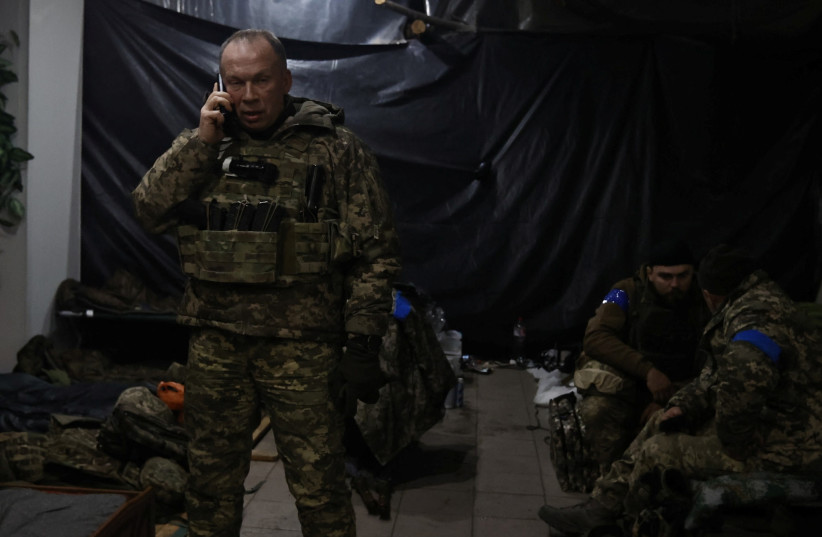Ukraine said on Thursday its troops were holding out against a massive onslaught of Russian artillery in the salt mining town of Soledar in the east, with drone footage showing utter devastation there and buildings reduced to smoldering husks.
In a video address, Ukrainian President Volodymyr Zelensky thanked two Ukrainian units in Soledar which he said "are holding their positions and inflicting significant losses on the enemy." He did not give more details.
Zelensky said he had met senior Ukrainian commanders on Thursday and analyzed the need for reinforcements in Soledar and nearby towns in the eastern industrial area known as the Donbas and next steps for the coming days.
Russia's ultra-nationalist contract militia Wagner Group, run by an ally of President Vladimir Putin, has claimed to have taken Soledar after intense fighting that it said left the town strewn with Ukrainian dead.
Moscow however, has held off officially proclaiming a victory, which would be its first significant gain in six months.

"At the moment, there are still some small pockets of resistance in Soledar," Andrei Bayevsky, a Russian-installed local politician, said in an online broadcast.
A 24-year-old Ukrainian soldier, positioned outside Soledar, said: "The situation is difficult but stable. We're holding back the enemy ... we're fighting back."
US officials question significance of Soledar
US officials questioned the importance of a Russian victory in Soledar even if that were true.
Soledar lies less than 10 km (6 miles) northeast of the city of Bakhmut where fighting has raged for months in one of the war's bloodiest battles - dubbed the "meat grinder."
"Even if both Bakhmut and Soledar fall to the Russians, it’s not going to have a strategic impact on the war itself,” US National Security Council spokesman John Kirby told reporters at the White House, “and it certainly isn’t going to stop the Ukrainians or slow them down.”
Drone footage obtained by Reuters of a medical evacuation from Soledar by Ukrainian soldiers showed deserted streets where just a few ruined buildings remained standing, amid blasted trees and smoldering rubble.
Ukraine has acknowledged Russian advances but Ukrainian Deputy Defence Minister Hanna Malyar said on Telegram fighting was still fierce and Russians were "moving over their own corpses."
Reuters was unable to independently verify the situation.
Donetsk governor Pavlo Kyrylenko told Ukrainian state TV that 559 civilians remained in Soledar, including 15 children, and could not be evacuated from the community that had a pre-war population of about 10,000.
If Russia was able to capture Soledar, it would likely be able to use that position to intensify its assault on Bakhmut. Soledar is also home to cavernous salt mines, which could be a commercially lucrative asset.
Donetsk governor Pavlo Kyrylenko told Ukrainian state TV that 559 civilians remained in Soledar, including 15 children, and could not be evacuated.
Moscow puts chief of general staff in direct command of invasion
Kremlin-watchers were poring over Russia's latest switch of battlefield leadership, a day after Valery Gerasimov, chief of the military's general staff, was unexpectedly given direct command of the invasion.
The previous commander of three months' standing, Army General Sergei Surovikin, was effectively demoted to become one of Gerasimov's three deputies.
Moscow explained the decision - at least the third abrupt change of top commander in the 11-month conflict - as a response to the campaign's growing importance.
The shuffle "likely does reflect some of the systemic challenges that the Russian military has faced since the beginning of this invasion," Brig. Gen. Patrick Ryder told a news briefing, citing problems with logistics, command and morale, among others.
A delegation headed by the commander of Russia's ground forces, Oleg Salyukov, visited Belarus on Thursday to inspect the combat readiness of a joint force stationed there, the Belarusian defense ministry said.
Salyukov was named as one of the deputy commanders of Russia's military operation in Ukraine in the reshuffle.
Across Ukraine, the frontlines have barely budged since Russia's last big retreat in the south two months ago. Kyiv hopes heavy armor from Western allies will allow it to resume advances.
Western countries have started to send advanced weaponry like the sophisticated US Patriot missile system, with the United States, Germany and France last week pledging armored fighting vehicles - as the focus now has shifted to main battle tanks.
The Kremlin said on Monday that new deliveries of weapons, including French-made armored vehicles, to Kyiv would "deepen the suffering of the Ukrainian people" and would not change the course of the conflict.
Polish President Andrzej Duda promised Ukraine a company of 14 German-made Leopard battle tanks, part of what he called an international coalition.
Zelensky told Polish state-run broadcaster TVP Info that this move could pave the way for other countries to follow.
Germany, whose permission would be required for Poland's move, on Thursday appeared to yield. Vice Chancellor Robert Habeck said, "Germany should not stand in the way of other countries taking decisions to support Ukraine."
Britain has also said it is considering sending tanks.
Putin launched the invasion on Feb. 24, saying Kyiv's ties with the West threatened Russia's security. Ukraine and its allies call it an unprovoked war to seize territory.
